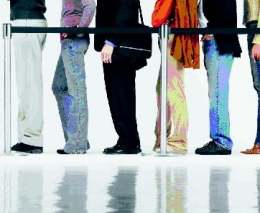A significant number of post-accession Polish migrants intend to survive the global crisis abroad – with many wanting to remain for good, says a report published recently by the Centre for International Relations in Poland (CIR).
Relying on estimates from Polish consulates and diaspora organisations, the CIR says the recession has not caused massive repatriations, but has reduced emigration from Poland and changed the reasons why people return home – lack of employment replacing homesickness as the reason most cited.
Economic migrants from the UK and Ireland dominate among those who have returned to Poland in recent times. More than 1,660 people transferred their unemployment benefit from Ireland to Poland in 2008.
Others, however, are prepared to stick it out in their host countries.
Karolina Nawias, 29, came to Ireland four years ago after studying business in Poland. Nine months ago she lost her job as a sales and administration assistant, and subsequently invested €1,500 in a graphic design course to increase her chances for new employment. But it hasn’t paid off so far.
“At the moment I am looking for any kind of job, even cleaning,” she says. “Unfortunately, I’m told I am overqualified. If I apply for more ambitious jobs, I don’t have enough experience. I tried to get experience and searched for unpaid internships – I was rejected.”
Naiwas has even considered migrating to another country for work. “If I returned to Poland, it would be just for a while, to decide what’s next,” she says.
But despite her troubles, Naiwas is staying here for the foreseeable future. “My life is in Ireland now,” she says. “All my things are here.”
She also has hopes that the economy will improve. “I monitor job websites and papers every day. I’ve noticed there’s about a third more job offers than at the beginning of the year.”
By the end of 2007, migrants accounted for 17 per cent of the total construction workforce in Ireland. When 28-year-old electrician technician Robert Kropicki arrived in Ireland, it was the easiest industry in which to find work.
“When it collapsed in the summer 2008 I lost my job,” he says. “I knew it would be difficult. Some of my friends had been let go. There were no contracts.”
Determined to hang on, he paid €400 for a fork lift course to get two three-months contracts.
“I worked hard in the hope my contracts will be extended but the worsening economic situation had influenced other sectors too,” he explains.
Since then, Kropicki takes casual employment whenever the opportunity arises.
“Working two or three days per week gives you a bit more money. It also gives you something to do,” he says.
The prospect of going back home has also crossed his mind. “I thought of returning to Poland but only to study. I know that it is difficult to get a decent job there. In my town the unemployment is at 12 per cent, but in Warsaw it’s only at 2.5 per cent.”
He even considered a move to Norway or Sweden “but the language and climate put me off”.
Instead, Ireland will continue to be home for Kropicki and thousands more like him. “I like Ireland,” he says. “You can survive living modestly and wait for the improvement in the economy and a normal permanent job. This keeps me here.”












